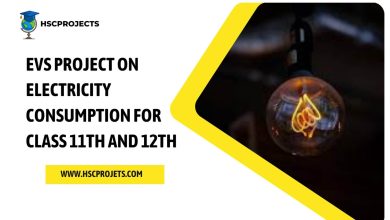
Project On Types Of Company For Class 11th & 12th
Introduction
In the intricate tapestry of the modern business world, companies stand as central pillars, orchestrating a multitude of economic activities, delivering goods and services, and serving as the bedrock of employment. The importance of comprehending the diverse types of companies cannot be overstated, especially for students in the 11th and 12th grades. This knowledge lays the groundwork for understanding the intricate nuances of business structures and legal frameworks, providing them with a solid foundation as future entrepreneurs, business professionals, or investors.

Objectives
- Familiarization with Company Types: To acquaint students with the various categories and classifications of companies that exist in the business realm.
- Exploration of Characteristics: To delve into the distinctive features and traits that define each type of company.
- Real-World Examples: To offer real-world examples that illustrate how different companies align with these categories.
Types of Companies
- Sole Proprietorship:
- Definition: A business entity solely owned and operated by a single individual.
- Characteristics:
- Simplicity: It represents the simplest form of business structure, characterized by its minimalistic approach.
- Singular Ownership: The owner assumes complete responsibility for both profits and losses.
- Unlimited Liability: In this structure, personal assets are at risk, leading to unlimited liability.
- Example: Think of your local corner store, the quaint family restaurant around the corner – these are quintessential examples of sole proprietorships.
2. Partnership:
- Definition: A business structure where two or more individuals collaborate to manage and operate a business, guided by the terms and objectives set out in a Partnership Deed.
- Characteristics:
- Shared Ventures: Partners mutually share the profits and losses, emphasizing collaboration.
- Liability: Liability can be limited in certain cases, such as in a Limited Liability Partnership (LLP).
- Example: Law firms, medical practices, and small consulting businesses often operate as partnerships.
3. Limited Liability Company (LLC) / Private Limited Company:
- Definition: A legal entity that provides limited liability protection to its owners.
- Characteristics:
- Limited Liability: Shareholders enjoy protection from personal liability.
- Ownership Transfer: Ownership can be easily transferred due to shareholding.
- Separate Legal Entity: The company exists as a distinct legal entity from its owners.
- Example: Emerging startups, family-owned enterprises, and smaller businesses often choose this structure.
4. Public Limited Company:
- Definition: A company that issues shares to the public, making these shares tradable on stock exchanges.
- Characteristics:
- Ownership via Shares: Ownership is determined by shares held by investors.
- Capital Access: Provides wider access to capital, enabling significant growth.
- Regulatory Scrutiny: Subject to stringent regulatory requirements to protect investors.
- Example: Corporate giants like Apple Inc., Microsoft Corporation, and Amazon.com are prime illustrations of public limited companies.
5. Government Company:
- Definition: A company where the government holds the majority of shares, emphasizing public welfare.
- Characteristics:
- Government Control: The government exercises substantial control and influence.
- Public Welfare: The primary objective is to serve public interests and welfare.
- Example: Bharat Heavy Electricals Limited (BHEL) is a noteworthy example, focusing on power generation equipment.
6. Multinational Corporation (MNC):
- Definition: A company with a global presence, operating in multiple countries and catering to a global market.
- Characteristics:
- Global Reach: MNCs have an expansive global presence, transcending borders.
- International Subsidiaries: They often have subsidiaries or branches in different countries.
- Example: Coca-Cola, Toyota, and Nestlé are exemplary multinational corporations, resonating with consumers worldwide.
Conclusion
Comprehending the kaleidoscope of company types is nothing short of fundamental when unraveling the intricacies of how businesses function and how they are structured. Each category of company possesses its own unique advantages and disadvantages, perfectly tailored to specific needs and objectives. As students continue their educational journeys and embark on their careers, this knowledge will remain increasingly relevant, whether they choose to contribute to an existing company, chart their own entrepreneurial path, or navigate the intricate world of stock market investments. The mosaic of the business world awaits exploration, and understanding the various types of companies is the first step towards unraveling its complexities.
Certificate of Completion
[Student’s Name][Class/Grade Level]This is to certify that I, [Student’s Name], a [Class/Grade Level] student, have successfully completed the project on “Types Of Company For Class 11th & 12th.” The project explores the fundamental principles and key aspects of the chosen topic, providing a comprehensive understanding of its significance and implications.
In this project, I delved into in-depth research and analysis, investigating various facets and relevant theories related to the chosen topic. I demonstrated dedication, diligence, and a high level of sincerity throughout the project’s completion.
Key Achievements:
Thoroughly researched and analyzed Project On Types Of Company For Class 11th & 12th.
Examined the historical background and evolution of the subject matter.
Explored the contributions of notable figures in the field.
Investigated the key theories and principles associated with the topic.
Discussed practical applications and real-world implications.
Considered critical viewpoints and alternative theories, fostering a well-rounded understanding.
This project has significantly enhanced my knowledge and critical thinking skills in the chosen field of study. It reflects my commitment to academic excellence and the pursuit of knowledge.
Date: [Date of Completion]Signature: [Your Signature] [School/Institution Name][Teacher’s/Examiner’s Name and Signature]
In order to download the PDF, You must follow on Youtube. Once done, Click on Submit
Follow On YoutubeSubscribed? Click on Confirm
Download Project On Types Of Company For Class 11th & 12th PDF






